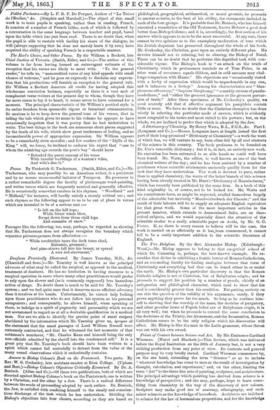Answer to Bishop Colenso's Book on the Pentaleuch. Two parts.
By Rev. W. G. Cookesley, late assistant-master at Eton College. (Upham and Beet.)--Bishop Colenso's Objections Critically Examined. By Dr. A. Beni-Bch- (Allan and Co.)—Of these two publications, both of which are directed against Bishop Colenso's book on the Pentateuch, one is written by a Christian, and the other by a Jew. There is a radical difference between the mode of proceeding adopted by each author. Dr. Benisch, the Jew, is satisfied with confining himself to the steady and conscien- tious discharge of the task 'which he has undertaken. Dividing the Bishop's objections into four classes, according as they are based on philological, geographical, arithmetical, or moral grounds, he proceeds to answer seriatim, to the best of his ability, the statements included in each of the four groups. It is probable that Dr. Benisch, who has himself
executed a translation of the Old Testament, knows Hebrew a good deal better than Bishop Colenso; and it is, accordingly, the first section of his answer which appears to us to be the most successful. At any rate, there cannot be two opinions as to the exemplary moderation of tone which the Jewish disputant has preserved throughout the whole of his book.
Mr. Cookesley, the Christian, goes upon an entirely different plan. He devotes himself not to refuting, but to abusing, the Bishop of Natal. There can be no doubt that he performs this dignified task with con- siderable vigour. The Bishop's book is "an attack on the truth of Christianity which in profaneness reminds us of Tom Paine, in an utter want of reverence equals Gibbon, and in cold sarcasm may chal- lenge comparison with Hume." His objections are occasionally stated with a levity of expression which would be unpardonable in any one, and is infamous in a bishop." Among his characteristics are " blas- phemous effrontery," "impious blasphemy," "a muddy stream of puzzle- headedness," and "either the grossest ignorance or the grossest perver- sion of truth." After these specimens of Mr. Cookesley's quality, we need scarcely add that of effective argument his pamphlets contain little or none. We have no doubt that the Christian champion has done wisely in selecting the particular mode of answer, which is evidently most congenial to his tastes and most suited to his powers ; but, on the whole, we are inclined to prefer that which is adopted by the Jew.






























 Previous page
Previous page